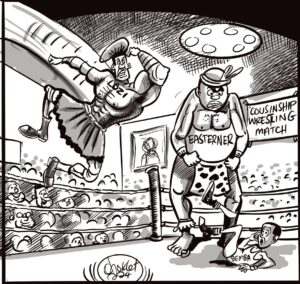THE Electoral Commission of Zambia (ECZ) has moved the dates for the mobile voter registration exercise which was scheduled to be conducted between October 19 and November 20, 2020, to between October 28 and November 30.
And the ECZ says already registered voters will be retained in the new register on condition that they present themselves for verification, update and capture of additional required information, or risk being considered as deceased.
Announcing the development at a press briefing in Lusaka, Thursday, ECZ chief electoral officer Patrick Nshindano said that the decision to postpone the voter registration dates was in order to accommodate eligible citizens, who would have acquired National Registration Cards (NRCs) to register as voters.
“To ensure that no one who has obtained an NRC is left behind, the Commission has been prompted to reschedule the dates for the registration of voters. In this regard, the mobile voter registration exercise, which was scheduled to run from 19th October, 2020, to 20th November, will now be conducted from 28th October, 2020, to 30th November, 2020. This is to accommodate eligible citizens who would have obtained the NRCs to register as voters,” Nshindano said.
He said that in an event the mobile NRC registration was adjusted further, the Commission would equally make the necessary adjustments.
“It should be noted, however, that should there be any adjustments in the issuance of NRCs, the Commission will be able to adjust the registration process again. In the same vein, allow me to also talk about the pre-registration of voters. Let me hasten to state that the dates for the commencement of the online pre-registration exercise remain unchanged. The online pre-registration will commence on 21st September, but as opposed to ending on 1st November, it will end on 6th November, 2020. This implies that the pre-online voter registration exercise will run for a total period of 46 days,” he said.
He said that the Commission has integrated all the recommendations, which it received during the online pre-registration of voters into the final online voter registration platform.
“In the same vein, the Commission conducted the first phase of the better testing for the online pre-registration platform from 18th July, 2020, to 25th July, 2020. The second testing phase of the online pre-registration was done from 31st August, 2020, to 7th September, 2020. This was the final testing exercise and this has been closed. The purpose of this testing exercise was to get feedback from the users on the efficiency and effectiveness of the system. And I can confidently confirm that this exercise was a success and received feedback both in the first and second phase, which was very positive and constructive; those recommendations have also been integrated in the final platform that will be used for the online pre-registration exercise,” Nshindano said.
“I wish to reiterate that the online voter registration is not an end-to-end process and all those who will pre-register online will still be required to finish the process at the registration centres where their biometrics will be captured and issued with a voter’s card. The pre-online system allows you to provide your details to us in advance on the online platform and then you have to present yourself before a registration officer, who will capture your details, your biometrics and also issue you with a card and also verify your identity as a citizen.”
And Nshindano cautioned that any eligible voter who failed to present themselves for verification would be considered as deceased.
“But further, as part of the process, the Commission will consider one who is registered as deceased if they do not present themselves, as part of the process involves the removal of the deceased persons from the register,” he said.
He also clarified that all the already-registered voters will be retained in the new register, but on condition that they presented themselves for verification, update and capture of additional required information.
“Allow me to also reiterate, and this is something that has a lot of mixed interpretations that all eligible Zambians that are eligible to vote must ensure that they turn up to register. This is regardless of whether you have a [voter’s] card now or not in order for them to participate in the 2021 general election and, indeed, future elections. Whilst the Commission will retain the current registered voters, all those that are registered will be retained. This is conditional. It is on condition that they present themselves for verification, update, and capture of additional required information, including the biometric system that we introduced, that is your ten finger prints and your portrait, and, indeed, the issuance of a new voter’s card,” he said.
Meanwhile, Nshindano said that the Commission was in the process of undertaking a pilot project to convert streams into polling centres for next week’s Mwansabombwe and Lukashya by-elections.
“The Commission has in the past shared its intention to turn streams into polling stations as part of the enhancement for result management and to generally quicken the voting process, counting, announcement, and declaration of results. The Commission will now pilot the conversion of streams in the forthcoming Mwansabombwe and Lukashya parliamentary by-elections, which are scheduled for 17th September, 2020. This plan has already been communicated to participants in the two elections, who have supported the idea. The Commission will share the effectiveness of this pilot and share with political parties and, indeed, the general public on the changes that will be put in place in the 2021 general election,” said Nshindano.












